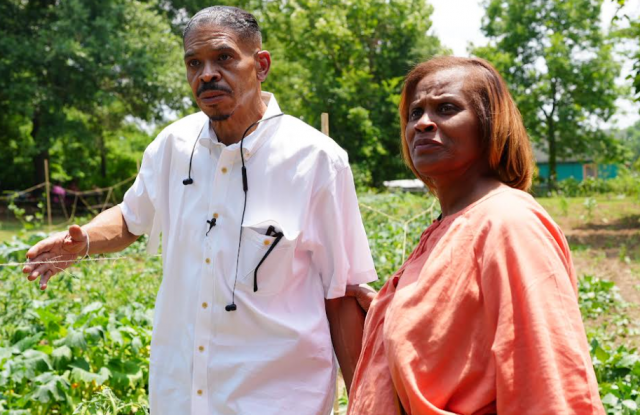
By Cody Owens
birminghamalcitycouncil.org
Dr. Matthew B. Johnson, pastor at Mt. Moriah Baptist Church, likes to refer to his community garden located on a previously unused parcel of land next to his church in Pratt City as “The Miracle on Avenue U.”
Rows of watermelon, cabbage, squash, peppers and herbs stretch out in the sunny clearing nestled between tall trees in the community.
“Sometimes I’ll just come out here and watch everything grow for a few hours,” said Johnson as he carefully stepped over a row of okra he had planted several weeks prior. “I always feel better after being out here for a few hours.”
At first glance, you wouldn’t know that the community garden has only been around for only eight weeks.
“People keep saying to me, ‘oh this is a food desert’ and I have to correct them and say, ‘we’re in a food wilderness.’ A desert implies that the land is barren and you can’t do anything with it. A wilderness just needs to be settled and tamed. That’s exactly what we’re trying to do here,” Johnson said as he continued making his way down the row of okra plants already up to his waist.
In the coming months, Johnson wants to establish a market at the Prince of Pratt Farm and Gardens (he calls it the “Farmacy”), where members of the community can come and take produce and leave a donation.
Johnson has a background in quantum mechanics and likes to have heady conversations. “I think the fabric of the universe is frayed and the existence of dark matter is at odds with Einstein’s theory of light. But anyways…” he said, before pivoting back to what he sees as mankind’s role in the world. “I think we have a responsibility to use what we have in our hands. We had this land and I know how to farm. So we got to work.”
With the help of a handful of volunteers, the farm is already producing food for the community two months after it was a patch of dirt.
He got teary-eyed as he recalled the first chance he was able to provide a family with fresh produce he’d grown at the farm.
“This [resident] and her kids were walking past us on the street. When I gave her some squash we had just picked, the look on her face and the reaction from her, made this whole project worth it. You could tell she really needed it,” he said. “I’ve met more people while I’ve been working out here these last eight weeks, than I did in the last eight years. The spirit of what this garden is has already spilled out across the neighborhood.”
Birmingham City Councilor LaTonya Tate joined Rev. Johnson on a recent tour and spoke to how these community-driven projects can have a multiplier effect.
“This is going to be a game changer for this neighborhood. You can already tell how it’s galvanized this corridor,” Tate said, pointing down the tree-lined street. She paused to greet a few people passing by who expressed their admiration for the farm.
“This is such a prime example of ‘take pride where you reside’ that Mayor [Randall] Woodfin always talks to us about. We want to take one block at a time and put effort into revitalizing it. And to see what Dr. Johnson has done in such a short amount of time is really an inspiration.”
As the farm continues to grow, Johnson wants to implement educational components, teaching students about urban agriculture and gardening as well as lessons on how to can and preserve fruits and vegetables. He also sees this farm as a way to teach anyone who will listen about the value of life.
“It was agriculture and farming that saved me from the perils of the city,” said Johnson, as he rattled off names of family members who he has lost to violent crime. “I chose another path. I know what seeing life and seeing things grow can do to your sense of its value. When you learn to grow and care for living things, you’re less likely to go and kill. Anybody can complain about how we’ve lost the value of life, but what restores that is handling it, caring for it and grounding yourself in the dirt.”



